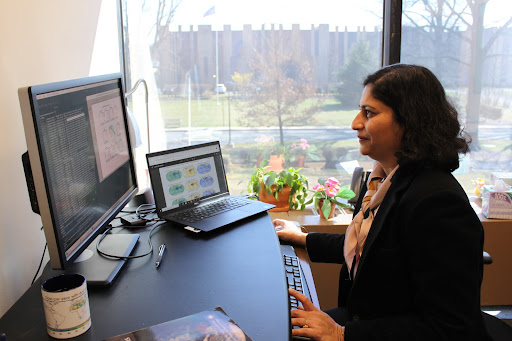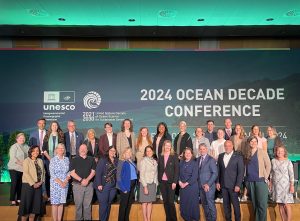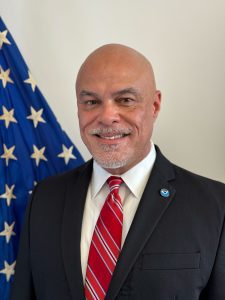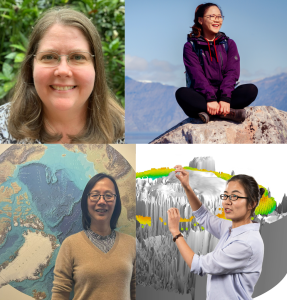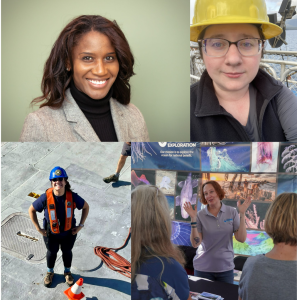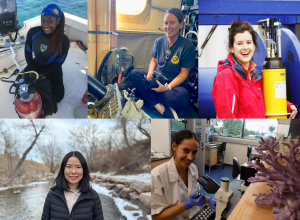To celebrate Women’s History Month, we asked women throughout NOAA Research who make lasting impacts in scientific research, leadership, and support from the field to the office to share how their work contributes to NOAA’s mission of Climate Resilience and preparing for a Climate-Ready Nation. This article highlights an interview with Vaishali Naik, a physical scientist at NOAA’s Geophysical Fluid Dynamics Laboratory (GFDL). Dr. Naik’s work focuses on developing and applying Global Earth System Models to study how atmospheric chemical composition, specifically short-lived gases and aerosols, interact with human-caused climate change.
Our conversation follows:
What does climate resilience or climate-ready nation mean to you? What would you want people to know about NOAA’s work on climate resilience?
To me, climate resilience means being aware of why and how the climate is changing and what risks it poses so that we are better prepared to not only reduce but also cope with these risks. I would like to tell people that NOAA’s work covers a wide range of topics to help make our nation climate resilient. We provide actionable scientific information for understanding climate change and its impacts, either in the form of observations or model predictions that can be used to make informed policy decisions.
What projects or research are you working on now, and how does your work contribute to climate resilience?
I am currently involved in a team effort to advance and improve our global models to enable reliable predictions and projections of climate change and its impacts. Global models based on our scientific understanding of the processes in the atmosphere, land, ocean, ice and life and their interactions are the best tools we have to predict climate change and its future impacts in response to both human-caused (e.g., energy related carbon emissions) as well as natural (e.g., volcanic aerosols) climate drivers. It is necessary to develop and refine these models to produce reliable projections of climate change and enhance our climate resiliency.
What do you enjoy most about your work?
I really enjoy figuring things out and coming up with solutions. I spend a lot of my time looking at models and understanding their results. I get a great sense of accomplishment when I figure out why my model results deviate from current scientific understanding. I also derive satisfaction from mentoring early career scientists. Passing on information that I have benefited from as a scientist and contributing to someone’s career path gives me a strong sense of community at work.
Do you have a favorite moment or accomplishment in your career?
My most gratifying accomplishment has been co-leading Chapter 6 of the Intergovernmental Panel on Climate Change (IPCC) Sixth Assessment Report during the final stretch of the government approval process and helping produce a comprehensive assessment of the role of Short-lived Climate Forcers in the climate system. The chapter holds a special meaning for me as we overcame the challenges posed by Covid-19 during 2020-2021 to deliver the state of science on the connections between air pollution and climate change – information that can be used to inform policies to address both interconnected issues synergistically.
Over the course of your career, what changes or progress have you seen for women in science and the workplace? What advice would you give to a woman who is just starting her career?
The biggest and most influential change I have seen over the course of two decades of my career is that there are more women in science and the workplace, and this makes doing science so much more fun! More women are majoring in STEM, they are tackling challenging scientific problems, taking on leadership roles, and supporting and acting as role models for girls and women to follow in their footsteps.
But challenges remain. Women also have to work harder to demonstrate their scientific prowess, to prove their leadership potential, and are generally held at much higher standards than their male counterparts. I would give the following advice to a woman starting her career: believe in yourself, build a network of mentors and seek opportunities to act as a mentor. Believe in your strength, the work you do and don’t let setbacks lower your confidence. Surround yourself with mentors and allies who will help you improve, grow, and would be truly vested in your success. And finally, pass it forward – be a mentor and an ally for those who come behind you in the workplace.
What would you tell someone who wants to do climate-centered work, but doesn’t know where to start?
For someone interested in starting climate-centered work, I would point them to a few resources: NOAA’s website as well as climate.gov, which have information on a wide range of climate-related topics, the IPCC reports (especially the technical summary and the summary for policymakers as a starting point), and the U.S National Climate Assessments with much more U.S. centric information. I would also encourage them to brush up on data analysis and visualization skills that will help in analyzing observations and climate model output.
Special thanks to Vaishali Naik for participating in this interview for Women’s History Month at NOAA.
